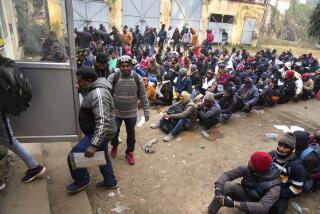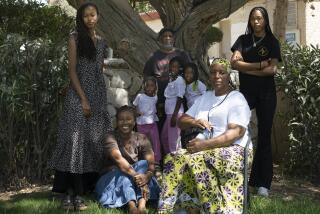Russian Immigrants Find Jobs in Israel Scarce : Mideast: Many of the half-million who arrived since 1989 have trouble fitting in, most notably professionals in a nation already overflowing with doctors, lawyers and engineers.
- Share via
JERUSALEM — Olga Gutman, a physician for more than 10 years, is too embarrassed to tell friends back in Russia that the only work she can find in Israel is scrubbing floors.
“I have peers who say they would rather go hungry, but when you have no choice, that’s what you do,” said Gutman, a native of Chelyabinsk who is 39 and has two children.
Her 13-year-old daughter Genya has trouble adjusting at school. Israeli classmates used to laugh at her, and now just call her a snob because she reads so much Pushkin poetry.
Many of the 475,580 Russians who came to Israel since 1989 have trouble fitting in, most notably professionals who find themselves in a nation of only 5.3 million already overflowing with doctors, lawyers and engineers.
Nineteen percent of immigrants from the former Soviet Union are unemployed, about double the national average. Only one-third work in their chosen fields.
Israel still has not figured out what to do with all the 130,000 immigrant doctors, scientists, engineers and teachers, who have doubled the numbers in those professions.
Immigrant violinists play on the street, leaving their cases open as collection boxes.
Some other new arrivals are more fortunate. Immigrant musicians, athletes, actors and dancers grace the arts. A Russian represented Israel at the Miss Universe contest and Michael Shmerkin, a champion skater from Ukraine, competed for Israel at the winter Olympics in Lillehammer.
Prime Minister Yitzhak Rabin noted in a speech that Israel had no work for the 3,500 immigrant Russian miners. “We do have many mine fields here,” he said, “but not a single mine.”
For many of the newcomers, finding a place in the new society is as hard as finding work.
According to a study by the Jewish Agency, a quasi-official body that handles immigration, 77% of immigrants since 1992 have had little or no social contact with native Israelis. Only 8% of those questioned said they felt a sense of belonging to Israeli society.
Native Israelis, envious of tax breaks and other benefits given immigrants, often are more hindrance than help. They make Russians the butt of jokes and blame them for everything from bad driving to increasing alcoholism and crime.
Instead of trying to adapt, many newcomers retreat into their own subculture. There are Russian bars, cafes, libraries and theater groups. Several dozen Russian-language newspapers and magazines have sprung up.
Maria Sorkin, 45, who came to Israel four years ago, takes her 7-year-old son, Benjamin, to a Russian-language theater club every week.
“I prefer a Russian teacher,” she said. “They don’t let the kids just have fun. They teach them something.”
She rarely mingles with Israelis.
“We don’t like falafel and they don’t like ballet,” she said. “That’s the problem.”
Falafel, fried balls of chick-pea paste, are a national dish in Israel.
Word of the adjustment problems appears to be a factor in the decline of immigration from Russia, which fell to 65,700 last year from nearly 200,000 in 1990,
“Russian Jews are stuck between the hammer and the anvil,” said Yuli Kashorovsky, who was jailed for Jewish activism in the Soviet Union and came to Israel in 1984.
Jews are anxious to leave the uncertainty of Russia, he said, “but not enthusiastic about joining a custodial labor force in Israel.”
An estimated 600,000 Russian Jews have exit visas, but many are waiting. Israeli officials predict half will come by 1996.
The 800,000 Israelis of Russian origin already here have become the largest immigrant group and a significant political force. Many accuse Rabin of neglecting them.
Some immigrant leaders have threatened to vote Rabin’s Labor Party out of office in the next elections, scheduled for 1996, unless he comes up with more jobs. In 1992, the Russian vote was an important part of Labor’s victory over the right-wing Likud bloc.
As Kashorovsky put it: “The government has to understand that it isn’t enough to talk a good game and then come to immigrants for votes. . . . What we are looking for is results, jobs.”
Natan Sharansky, the former Soviet political prisoner who leads the Russian-immigrant lobby, said in an open letter to Rabin that “not enough has been done to solve the problems faced by the new immigrants, especially those of employment and underemployment.”
Yair Tsaban, the immigrant absorption minister, said in an interview that Israeli is “probably the only country in the world that not only doesn’t object to the immigrant flood, we invite the flood. We want as many as possible to arrive.”
Although he feels more could be done, Tsaban said, the Russians are getting more help than their predecessors. He noted that government-backed mortgages had enabled half the families to buy apartments, an unprecedented figure among immigrants.
More to Read
Sign up for Essential California
The most important California stories and recommendations in your inbox every morning.
You may occasionally receive promotional content from the Los Angeles Times.













